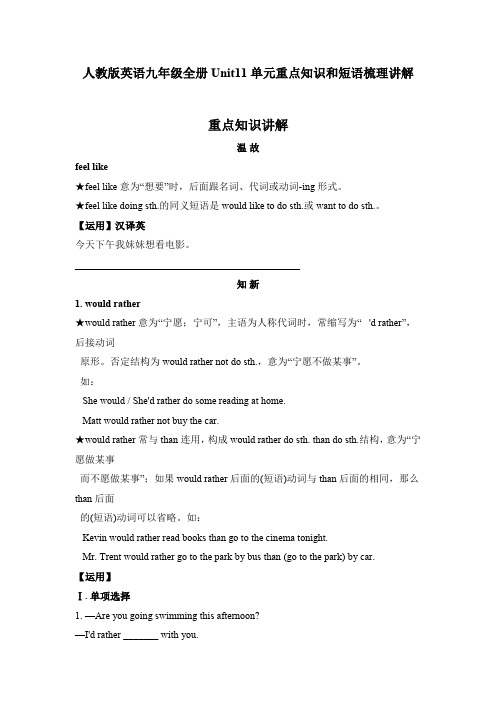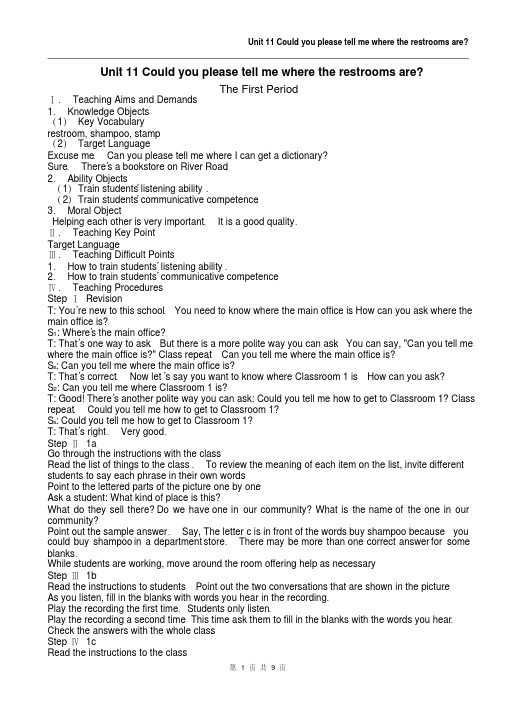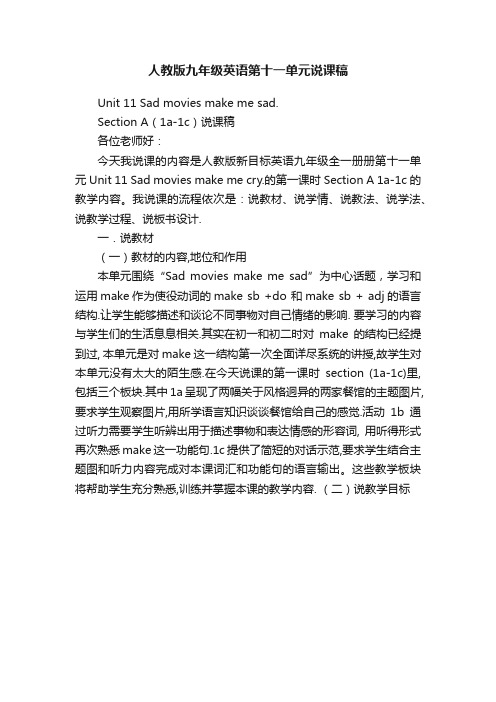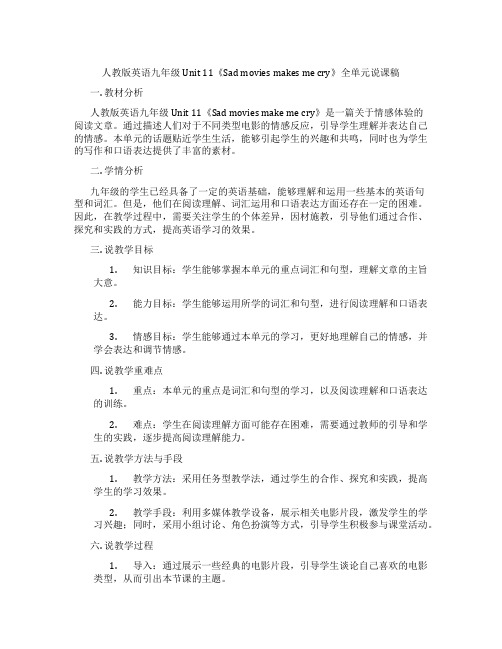人教版九年级英语第11单元知识点备课讲稿
人教版英语九年级全册Unit11单元重点知识和短语梳理讲解

人教版英语九年级全册Unit11单元重点知识和短语梳理讲解重点知识讲解温故feel like★feel like意为“想要”时,后面跟名词、代词或动词-ing形式。
★feel like doing sth.的同义短语是would like to do sth.或want to do sth.。
【运用】汉译英今天下午我妹妹想看电影。
_____________________________________________知新1. would rather★would rather 意为“宁愿;宁可”,主语为人称代词时,常缩写为“'d rather”,后接动词原形。
否定结构为would rather not do sth.,意为“宁愿不做某事”。
如:She would / She'd rather do some reading at home.Matt would rather not buy the car.★would rather常与than连用,构成would rather do sth. than do sth.结构,意为“宁愿做某事而不愿做某事”;如果would rather后面的(短语)动词与than后面的相同,那么than 后面的(短语)动词可以省略。
如:Kevin would rather read books than go to the cinema tonight.Mr. Trent would rather go to the park by bus than (go to the park) by car.【运用】Ⅰ. 单项选择1. —Are you going swimming this afternoon?—I'd rather _______ with you.A. to go shoppingB. go shopingC. to go shopingD. go shopping(2016 甘肃兰州)2. His uncle would rather _______ in the countryside than _______ to the city.A. stay; movingB. to stay; moveC. stay; moveD. to stay; to move(2015 山东烟台) Ⅱ. 汉译英1. 本(Ben)宁愿不搬到一所更大的房子里。
人教版九年级英语(全一册)Unit11_SectionA_教材重难点知识详解

Unit11 SectionA 教材重难点知识详解SectionA(1a-2d)1. I’d rather go to the Blue Ocean Restaurant because I like to listen to quiet music while I’m eating.would rather do sth.意为“宁可,宁愿”。
e.g. I’d rather play tennis than swim. 比起游泳我宁愿去打台球。
2. Yes, she was, and waiting for her drove me crazy.drive v.迫使drive sb.+adj.,使某人怎样drive sb. crazy/mad 使某人发疯/发狂e.g. That thing almost drive me crazy. 那件事几乎要使我发狂了。
You’ll drive mum mad one of these days.你这样总有一天会把妈妈急疯了的。
3. What happened?happen 发生,不及物动词,常见的用法有(1) “sth.+ha ppen+地点/时间”,“某地/某时发生了某事”e.g. What’s happening outside? 外面发生什么事了?(2) “sth.+happen to+sb.” 意为“某人出了某事(常指不好的事发生在某人身上)”e.g. A car accident happened to him yesterday. 昨天他发生了交通事故。
(3) “sb.+happen+to do sth.” 意为“某人碰巧做某事”e.g. I happened to meet her in the street.我碰巧在街上遇见她。
4. The more I got to know Julie, the more I’ve realized that we have a lot in common.the+比较级+从句,the +比较级+从句“越……, 越……”e.g. The harder you work, the greater progress you will make.你越用功,进步就越大。
英语知识点-九年级英语第11单元教案人教版【精选教案】

Unit 11 Could you please tell me where the restrooms are?第 1 页共9 页Unit 11 Could you please tell me where the restrooms are?The First PeriodⅠ.Teaching Aims and Demands1.Knowledge Objects (1)Key Vocabularyrestroom, shampoo, stamp (2)Target LanguageExcuse me .Can you please tell me where I can get a dictionary?Sure .There ’s a bookstore on River Road .2.Ability Objects(1)Train students ’ listening ability .(2)Train students ’ communicative competence .3.Moral ObjectHelping each other is very important .It is a good quality .Ⅱ.Teaching Key PointTarget Language Ⅲ.Teaching Difficult Points1.How to train students ’ listening ability .2.How to train students ’ communicative competence .Ⅳ.Teaching ProceduresStep ⅠRevisionT: You ’re new to this school .You need to know where the main office is .How can you ask where the main office is?S 1: Where ’s the main office?T: That ’s one way to ask .But there is a more polite way you can ask .You can say, "Can you tell me where the main office is?" Class repeat .Can you tell me where the main office is?S s : Can you tell me where the main office is?T: That ’s correct .Now let ’s say you want to know where Classroom 1 is .How can you ask? S 2: Can you tell me where Classroom 1 is?T: Good! There ’s another polite way you can ask: Could you tell me how to get to Classroom 1? Class repeat .Could you tell me how to get to Classroom 1?S s : Could you tell me how to get to Classroom 1?T: That ’s right .Very good .Step Ⅱ1aGo through the instructions with the class .Read the list of things to the class .To review the meaning of each item on the list, invite different students to say each phrase in their own words .Point to the lettered parts of the picture one by one .Ask a student: What kind of place is this?What do they sell there? Do we have one in our community? What is the name of the one in our community?Point out the sample answer .Say, The letter c is in front of the words buy shampoo because you could buy shampoo in a department store .There may be more than one correct answer for some blanks .While students are working, move around the room offering help as necessary .Step Ⅲ1bRead the instructions to students .Point out the two conversations that are shown in the picture .As you listen, fill in the blanks with words you hear in the recording .Play the recording the first time .Students only listen .Play the recording a second time .This time ask them to fill in the blanks with the words you hear .Check the answers with the whole class .Step Ⅳ1cRead the instructions to the class .。
九年级英语u11知识点人教版

九年级英语u11知识点人教版英语作为一门国际语言,对于学生的学习十分重要。
而九年级英语U11知识点是学生们进一步巩固英语知识的重要阶段。
本文将从听力、口语、阅读和写作四个方面介绍九年级英语U11知识点。
听力篇:九年级英语U11知识点的听力环节主要包括辨音、对话和短文理解。
在辨音部分,学生需要注意熟悉英语中的元音和辅音的发音规则。
对话部分的重点在于学生的听力理解能力和对日常对话的掌握程度。
短文理解则要求学生能够通过听力材料获取关键信息,理解短文的主旨和细节。
口语篇:九年级英语U11知识点的口语训练主要包括对话和情景表达。
对话部分要求学生能够用正确的语法和词汇进行简单的对话,流利表达自己的意思。
情景表达则要求学生能够在特定情景下进行交际,如介绍自己的家乡、描述一幅图片等。
阅读篇:九年级英语U11知识点的阅读部分主要包括阅读理解和阅读填空。
阅读理解要求学生通过阅读短文,获取关键信息,理解短文的主旨和细节。
同时,学生需要通过阅读填空来巩固对语法和词汇的理解和应用能力。
写作篇:九年级英语U11知识点的写作部分主要包括书面表达和短文改错。
书面表达要求学生能够根据提供的信息,写出一篇连贯、清晰、具体的文章。
短文改错则要求学生能够发现并改正文中的语法错误和拼写错误。
除了以上四个方面的知识点,九年级英语U11知识点还包括词汇和语法。
词汇部分主要包括动词短语、常用短语、常用表达和句型等。
语法部分主要包括时态、语态、情态动词、被动语态、虚拟语气、部分倒装和倒装句等。
在学习九年级英语U11知识点时,学生们需要注意的是要把握好基本的语法和词汇,多进行听力和口语训练,增加对英语的实际运用能力。
同时,也要注重阅读和写作的训练,提高对英语材料的理解和表达能力。
总之,九年级英语U11知识点的学习要求学生在听力、口语、阅读和写作四个方面进行全面的训练。
通过不断的学习和练习,提高自己的英语水平。
希望本文对广大九年级英语学生在U11知识点的学习中有所帮助。
人教版九年级英语第十一单元说课稿

人教版九年级英语第十一单元说课稿
Unit 11 Sad movies make me sad.
Section A(1a-1c)说课稿
各位老师好:
今天我说课的内容是人教版新目标英语九年级全一册册第十一单元Unit 11 Sad movies make me cry.的第一课时Section A 1a-1c的教学内容。
我说课的流程依次是:说教材、说学情、说教法、说学法、说教学过程、说板书设计.
一.说教材
(一)教材的内容,地位和作用
本单元围绕“Sad movies make me sad”为中心话题,学习和运用make作为使役动词的make sb +do 和make sb + adj的语言结构.让学生能够描述和谈论不同事物对自己情绪的影响. 要学习的内容与学生们的生活息息相关.其实在初一和初二时对make的结构已经提到过, 本单元是对make 这一结构第一次全面详尽系统的讲授,故学生对本单元没有太大的陌生感.在今天说课的第一课时section (1a-1c)里, 包括三个板块.其中1a呈现了两幅关于风格迥异的两家餐馆的主题图片,要求学生观察图片,用所学语言知识谈谈餐馆给自己的感觉.活动1b通过听力需要学生听辨出用于描述事物和表达情感的形容词, 用听得形式再次熟悉make这一功能句.1c提供了简短的对话示范,要求学生结合主题图和听力内容完成对本课词汇和功能句的语言输出。
这些教学板块将帮助学生充分熟悉,训练并掌握本课的教学内容. (二)说教学目标。
九年级英语第 十一 单元教案人教版

Unit 11 Could you please tell mewhere the restrooms are?第一课时单元分析与提示教学目标语言目标:1、学会问路以达到购物的目的;2、学会为他人指明方向和路线。
3、学会利用活动和购物场来表达自己的爱好和看法。
认知目标1、学习礼貌地询问信息;Could you please tell me where the restrooms are?Excuse me. Do you know where I can save money?2、学习含宾语从句的间接问句,对宾语从句进行归纳、总结。
情感目标通过帮助别人来培养乐于助人的良好思想品德。
教学重、难点宾语从句及直接引语和间接引语所谓宾语从句就是一个句子在另一个主句中作宾语,即宾语从句是用句子作宾语。
当我们引用别人的话时,可以用别人的原话,也可以用自己的话把意思转述出来。
如果是引用原话,被引用的部分就叫作直接引语,否则称为间接引语。
1、宾语从句的结构。
1)由that引导的宾语从句。
She said that she would come.2)由连词if或whether引导。
翻译为“是否”,从句用陈述句语序Do you know if Mr Smith is at home?3)由连接代词who, whom, whose, which, what或连接副词when,where, how, why等引导。
从句用陈述句语序。
Do you know who broke the window?I don’t know when I shall finish4)某些形容词之后的从句有时也被看作是宾语从句。
如:afraid, wure, sorry, glad, worried, angry, confident.I’m sorry that I’m late again.They were angry that they had lost the chance.2、宾语从句的时态一致主句是过去时,宾语从句要用过去时态;主句是现在时或将来时,宾语从句则该用什么时态就用什么时态。
人教版英语九年级Unit11《Sadmoviesmakesmecry》全单元说课稿

人教版英语九年级Unit 11《Sad movies makes me cry》全单元说课稿一. 教材分析人教版英语九年级Unit 11《Sad movies make me cry》是一篇关于情感体验的阅读文章。
通过描述人们对于不同类型电影的情感反应,引导学生理解并表达自己的情感。
本单元的话题贴近学生生活,能够引起学生的兴趣和共鸣,同时也为学生的写作和口语表达提供了丰富的素材。
二. 学情分析九年级的学生已经具备了一定的英语基础,能够理解和运用一些基本的英语句型和词汇。
但是,他们在阅读理解、词汇运用和口语表达方面还存在一定的困难。
因此,在教学过程中,需要关注学生的个体差异,因材施教,引导他们通过合作、探究和实践的方式,提高英语学习的效果。
三. 说教学目标1.知识目标:学生能够掌握本单元的重点词汇和句型,理解文章的主旨大意。
2.能力目标:学生能够运用所学的词汇和句型,进行阅读理解和口语表达。
3.情感目标:学生能够通过本单元的学习,更好地理解自己的情感,并学会表达和调节情感。
四. 说教学重难点1.重点:本单元的重点是词汇和句型的学习,以及阅读理解和口语表达的训练。
2.难点:学生在阅读理解方面可能存在困难,需要通过教师的引导和学生的实践,逐步提高阅读理解能力。
五. 说教学方法与手段1.教学方法:采用任务型教学法,通过学生的合作、探究和实践,提高学生的学习效果。
2.教学手段:利用多媒体教学设备,展示相关电影片段,激发学生的学习兴趣;同时,采用小组讨论、角色扮演等方式,引导学生积极参与课堂活动。
六. 说教学过程1.导入:通过展示一些经典的电影片段,引导学生谈论自己喜欢的电影类型,从而引出本节课的主题。
2.阅读理解:学生独立阅读文章,完成相关练习题,教师引导学生讨论答案,解答疑惑。
3.词汇学习:学生通过小组合作,归纳和总结文章中的重点词汇和句型,教师进行讲解和拓展。
4.口语表达:学生分组进行角色扮演,模拟文章中的情景,进行口语表达。
人教版英语九年级全册Unit11单元重点知识和短语梳理讲解

人教版英语九年级全册Unit11单元重点知识和短语梳理讲解重点知识讲解温故feel like★feel like意为“想要”时,后面跟名词、代词或动词-ing形式。
★feel like doing sth.的同义短语是would like to do sth.或want to do sth.。
【运用】汉译英今天下午我妹妹想看电影。
_____________________________________________知新1. would rather★would rather 意为“宁愿;宁可”,主语为人称代词时,常缩写为“'d rather”,后接动词原形。
否定结构为would rather not do sth.,意为“宁愿不做某事”。
如:She would / She'd rather do some reading at home.Matt would rather not buy the car.★would rather常与than连用,构成would rather do sth. than do sth.结构,意为“宁愿做某事而不愿做某事”;如果would rather后面的(短语)动词与than后面的相同,那么than 后面的(短语)动词可以省略。
如:Kevin would rather read books than go to the cinema tonight.Mr. Trent would rather go to the park by bus than (go to the park) by car.【运用】Ⅰ. 单项选择1. —Are you going swimming this afternoon?—I'd rather _______ with you.A. to go shoppingB. go shopingC. to go shopingD. go shopping(2016 甘肃兰州)2. His uncle would rather _______ in the countryside than _______ to the city.A. stay; movingB. to stay; moveC. stay; moveD. to stay; to move(2015 山东烟台) Ⅱ. 汉译英1. 本(Ben)宁愿不搬到一所更大的房子里。
- 1、下载文档前请自行甄别文档内容的完整性,平台不提供额外的编辑、内容补充、找答案等附加服务。
- 2、"仅部分预览"的文档,不可在线预览部分如存在完整性等问题,可反馈申请退款(可完整预览的文档不适用该条件!)。
- 3、如文档侵犯您的权益,请联系客服反馈,我们会尽快为您处理(人工客服工作时间:9:00-18:30)。
九年级英语
Unit11
1.宾语从句宾语从句在复合句中作主句的宾语。
①由连接词+ 主语+ 谓语构成
常由下面的一些连接词引导:
②由that 引导表示陈述意义that 可省略
He says (that) he is at home. 他说他在家里。
③由if , whether 引导表示一般疑问意义(带有是否、已否、对否等)
I don’t know if / whether Wei Hua likes fish.
我不知道韦华是否喜欢鱼。
④由连接代词、连接副词(疑问词) 引导表示特殊疑问意义
Do you know what he wants to buy? 你知道他想要买什么吗?
⑤从句时态要与主句一致
当主句是一般现在时,从句根据情况使用任何时态
He says (that ) he is at home. 他说他在家里。
I don’t know (that) she is singing now. 我不知道她正在唱歌。
She wants to know if I have finished my
homework.
她想要知道我是否已经完成了
我的作业。
Do you know when he will be back? 你知道他
将会什么时候回来?
当主句是一般过去时,从句应使用过去
某时态(一般过
去时,过去进行时,过去将来时,过去完
成时)
He said (that) he was at home. 他说他在家里。
I didn’t know that she was singing now. 我不知
道她正在唱歌。
She wanted to know if I had finished m
homework.
她想要知道我是否已经完成了
我的作业。
Did you know when he would be back? 你知道他
将会什么时候回来?
2. get v. 得到、买、到达
3. make a telephone call 打电话
4. save money 省钱、存钱
5. ①问路常用的句子:
②Can/Could/Will/Would you please tell me sth.
表示十分客气地询问事情
③Could you tell me how to get to the park?
请你告诉我怎么才能去邮局好吗?中的
how to get to the park
是疑问词与动词不定式连用,用作宾语,但不
是宾语从句,可是
相当于how I can get to the park(宾语从句)如:
I don’t know how to solve the problem. ==
I don’t know how I can solve the problem.我不知道
如何解决这个问题
Can you tell me when to leave? ==
Can you tell me when I ill leave? 你能告诉我什么
时候离开?
6. 日常交际用语:
take the elevator / escalator to the … floor.乘电
梯/自动扶梯到…楼
turn left / right === take a left / right 向左/ 右
转
go past 经过go straight 向前直走
7. next to旁边、紧接着如:Lily is next to Ann.
莉莉就在安的旁边。
8. between … and…在…和…之间
如: Lily is between Ann and Tom. 莉莉就在安
和汤姆的之间。
9. decide to do 决定做…
She decided to go to have lunch. 她决定去吃午餐。
decide v. decision n.
make a decision 做个决定
10. Is that a good place to hang out? 那是不是一个闲荡的好地方?
中的to hang out修饰前面名词place,不定式作定语.
如:There are something to eat. 这有吃的东西。
中的to eat修饰代词
something,作定语.
11. kind of +adj./ adv. 译为“有点、一点”
如:She is kind of shy. 她有点害羞。
12. expensive 贵的反义词inexpensive 不贵的
13. crowded 拥挤的反义词uncrowded 不拥挤的
14. take a vacation == go on a vacation 去度假
15. dress up 打扮dress up as 打扮成..
如:He wanted to dress up as Father Christmas.
他想要打扮成圣诞老人。
16. on the beach 在海滩上的介词用on
17. politely adv. 有礼貌地polite adj. 有礼貌的
18. depend on sth / doing / 从句根据、依靠、依赖、决定于
Living things depend on the sunlight.生物对阳光
有依赖性。
We can’t depend on his answer. 我们不能根据他
的回答。
That depends on how you did it. 那决定于你怎
样做这件事。
19. prefer动词更喜欢宁愿常用的结构有:
sth.更喜欢某事I prefer English. 我更
prefer doing/ to do宁愿做某事I prefer sitting/
我宁愿坐着。
sth to sth. 同…相比更喜欢…I prefer
dogs to cats.
与猫相比
我更喜欢狗。
prefer doing to doing宁愿做某事而不愿做某
事
I prefer walking to sitting. 我宁愿走路也不愿
坐着
prefer to do rather than do 宁愿做某事而不愿
做某事
I prefer to work rather than be free. 我宁愿工
作而不愿闲着。
20. on the other hand 另一方面
21. 把…借给某人
lend sb. sth. ==lend sth.to sb. 如:
Lily lent me her book. == Lily lent her book to
me .
莉莉把她的书借给了我。
22. such as 例如
23. I’m sorry to do sth. 对做某事我觉得很抱歉、伤
心。
24. in a way 在某种程度说
25. in order to do为了做…表目的如:
He got up early in order to catch the first bus.
他起早床,是为了赶上头班公共汽车。
26. 等级/同级比较:as…as ,not as/so…as
①as + 形容词/ 副词原级+ as
表示“和…一样的…”“…和…一样的…”
如:He works as hard as we. 他工作和我们
同样努力。
②否定式:not as + 形容词/ 副词原级+ as
== not so + 形容词/ 副词原级+ as
He doesn’t work as / so hard as we. 他工作没
有我们那样努力。
27. hand in 上交。
